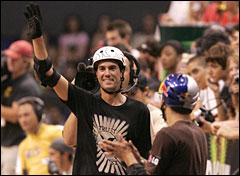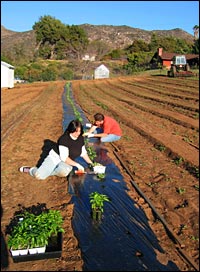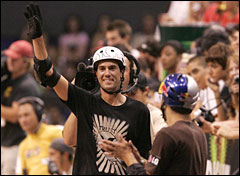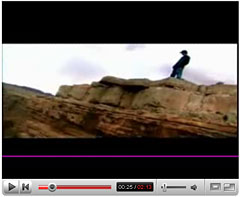
Bob Burnquist at the X Games XI, where he
took the gold medal for Skateboard Vert Best Trick.
Photo: Jason Merritt/WireImage
Bob Burnquist isn’t afraid of taking risks. In fact, he’s made a career out of it. The 30-year-old pro skateboarder is a 12-time medal-winner at the X Games, has developed and named a number of signature tricks, and last year launched himself off a ramp into the Grand Canyon — and into the history books.
But when it comes to his health and the health of the planet, Burnquist isn’t willing to risk anything. Born and raised in Brazil, he grew up eating fresh, local, organic foods — and it’s a passion he’s carried through his adult life. After running a vegetarian restaurant in Encinitas, Calif., with his family for several years, Burnquist has turned his foodie interests into a nonprofit effort to get organic gardening and farming into schools. Begun as a project of the Bob Burnquist Foundation, the program has taken on a life of its own, he says, expanding from a small effort at a school in California to a major undertaking in Orlando, Fla., thanks to a partnership with Toyota.
In his professional life, Burnquist has also strived to stick to his principles, connecting with green corporate sponsors like Stonyfield Farm and Sambazon, a company specializing in energy drinks made from the antioxidant-rich Brazilian fruit acai. Burnquist has also been a major advocate for sustainable action-sports events, urging X Games officials to use Forest Stewardship Council-certified wood on their ramps and provide healthy food choices from sponsors like Whole Foods.
Along with his wife (and fellow skater) Jen O’Brien, Burnquist is a founding member of the Action Sports Environmental Coalition, a nonprofit organization bringing eco-awareness to the skate-surf-BMX crowd — a crowd that extends far beyond the local skate park. In late January, some 70,000 people made their way to Aspen for the Winter X Games and millions more tuned in to watch the events on ESPN. In fact, the Summer and Winter X Games are the largest television productions the sports network puts on, and sponsors shell out at least seven figures to reach an audience largely comprised of the highly desirable 12 to 24 demographic.
Burnquist, too, is well aware that most of his fans are at an impressionable age. “As a kid, I remember looking up to professional skateboarders — what they did was cool, to me,” he says. “If the guy was like a punk rocker, I wanted to be a punk rocker.” Now, though, he hopes to provide a positive influence as more of a “sustainable hippie type.”
An overcommitted spokesguy for eco-issues and frequent traveler for skating competitions and other industry-related appearances (like starring in several of Tony Hawk’s video games), Burnquist can be difficult to pin down. But I managed to catch up with him for a phone interview while he was in Hawaii recently for several skate and surf events. Enthusiastic and earnest, Burnquist chatted about moving to the U.S., turning down major dough from Red Bull, and realizing that skateboarders make great environmentalists.
On his evolution as an environmentalist:
![]() I’m Brazilian — born in Rio, raised in São Paolo with an American father and a Brazilian mother, so I kind of grew up with the Brazilian culture in me. I grew up with the fresh fruit and the good food, so lush and green and beautiful all around me.
I’m Brazilian — born in Rio, raised in São Paolo with an American father and a Brazilian mother, so I kind of grew up with the Brazilian culture in me. I grew up with the fresh fruit and the good food, so lush and green and beautiful all around me.
When I moved to the U.S., I had a hard time with the transition in the diet. All of a sudden, I’m in the U.S. skating and traveling, and I’m eating fast food because that’s where the guys are going and it’s like, ‘Oh I’ll just go in here real quick, get it done, and then go skate.’ And I start feeling it taking its toll on me.
Then one day, after eating a burger at In-N-Out, I cruised by a farm with all these cows, and it just put everything into perspective about how food was being mass-produced and how the animals are being treated. I started reading up on what was going on here in the U.S. and it just freaked me out. I was like, ‘Oh man, I gotta change the way I eat for me to feel good so I can skate.’ And then also, as a conscious consumer, if I do my part and everyone else does their part, then we could actually change the industry and change what’s going on.![]()
On why skateboarders make great environmentalists:
![]() It’s really hard for a skateboarder to take ‘no’ for an answer. I’ll go out and skate, and if I’m trying a trick, I’ll try it all day long, and if I don’t make it, I’ll try again the next day until I make it. Try it again, fall again. Try it again, fall again. I think that it’s just so powerful because we’re not going to stop trying. We’re just going to keep trying until people are taking notice.
It’s really hard for a skateboarder to take ‘no’ for an answer. I’ll go out and skate, and if I’m trying a trick, I’ll try it all day long, and if I don’t make it, I’ll try again the next day until I make it. Try it again, fall again. Try it again, fall again. I think that it’s just so powerful because we’re not going to stop trying. We’re just going to keep trying until people are taking notice.![]()
On starting the Action Sports Environmental Coalition:
![]() ASEC became the perfect thing to do to be able to get the word out using my celebrity status — whatever that is in skateboarding and beyond — and connect with other like-minded skateboarders and BMXers and whoever’s involved. We called it ‘Action Sports’ because we wanted to be all-involving. I think it involves surfing because of the coastal [aspect], and snowboarding because of all the mountains and the wilderness there, and skateboarding’s important because of the urban impact. So if we try to get across to all the different lifestyles, we’ll make an impact together.
ASEC became the perfect thing to do to be able to get the word out using my celebrity status — whatever that is in skateboarding and beyond — and connect with other like-minded skateboarders and BMXers and whoever’s involved. We called it ‘Action Sports’ because we wanted to be all-involving. I think it involves surfing because of the coastal [aspect], and snowboarding because of all the mountains and the wilderness there, and skateboarding’s important because of the urban impact. So if we try to get across to all the different lifestyles, we’ll make an impact together.![]()
On greening athletic catering:
![]() The ultimate in green catering was the Toyota Challenge in San Jose for the Dew Tour this year. It was the best treatment we’ve ever gotten as skateboarders, as athletes, from the Whole Foods catering to the smoothie bar to the acai to all the energy bars, to the good food all over …
The ultimate in green catering was the Toyota Challenge in San Jose for the Dew Tour this year. It was the best treatment we’ve ever gotten as skateboarders, as athletes, from the Whole Foods catering to the smoothie bar to the acai to all the energy bars, to the good food all over …
Granted, the reason it was so good and I liked it so much is because I was able to be a big part in the consulting as to what goes in there — and everything that I put down as a dream thing was in. I just couldn’t believe that they went that route to spend that money to do it. It was insane, one of the best events — everyone skated really well. I think [the catering] had a huge impact on our performance.![]()
On choosing corporate sponsors:
![]() I think that’s where the biggest impact is. Instead of riding for Mountain Dew or Pepsi, I’d rather connect with a company like Stonyfield Farm or Sambazon. I mean I don’t get nearly as much as I would have if I went with Mountain Dew or Red Bull or Monster or all that stuff — they’re throwing money like crazy at our industry. I’m a top guy; I could get a pretty hefty check just to put a Red Bull helmet on and go out there. But I can’t do that … If I believe in something, I’ll endorse it, if I don’t, I can’t. I just can’t.
I think that’s where the biggest impact is. Instead of riding for Mountain Dew or Pepsi, I’d rather connect with a company like Stonyfield Farm or Sambazon. I mean I don’t get nearly as much as I would have if I went with Mountain Dew or Red Bull or Monster or all that stuff — they’re throwing money like crazy at our industry. I’m a top guy; I could get a pretty hefty check just to put a Red Bull helmet on and go out there. But I can’t do that … If I believe in something, I’ll endorse it, if I don’t, I can’t. I just can’t.![]()
On “Good Wood for the ‘Hood”:
![]() X Games does buy a lot of wood when they go to build all the ramps, so we connected them with the FSC-certified wood and then had them buy all the wood through that. Then instead of throwing it away or storing it [after the Games were over], we had them donate it to Compton, to the neighborhood. [ASEC] did this thing “Good Wood for the ‘Hood” — built this skate park with the Salvation Army, and then went out there and skated with the Compton kids afterward. Home Depot and ESPN were involved and donated a lot of the wood.
X Games does buy a lot of wood when they go to build all the ramps, so we connected them with the FSC-certified wood and then had them buy all the wood through that. Then instead of throwing it away or storing it [after the Games were over], we had them donate it to Compton, to the neighborhood. [ASEC] did this thing “Good Wood for the ‘Hood” — built this skate park with the Salvation Army, and then went out there and skated with the Compton kids afterward. Home Depot and ESPN were involved and donated a lot of the wood.![]()
On his effort to teach organic gardening in schools:

The Global Cooling Challenge at work
at San Pasqual Academy.
Photo: asecaction.org
![]() Why is there junk food all over the cafeteria when you’ve got all this landscaping around and you’re supposed to be a school. Why don’t you turn it all into an edible landscape and teach gardening? … How big of a lesson is that — if you can plant your own food at school and feel good about eating it? The cafeteria is flush with good produce that the students planted, and they learned something as they did it …
Why is there junk food all over the cafeteria when you’ve got all this landscaping around and you’re supposed to be a school. Why don’t you turn it all into an edible landscape and teach gardening? … How big of a lesson is that — if you can plant your own food at school and feel good about eating it? The cafeteria is flush with good produce that the students planted, and they learned something as they did it …
I just had this vision and feeling that the schools in the U.S. need to do more of that, especially with all these problems with obesity and diabetes and all that’s going on. The idea is ultimately to be able to reach as many schools as possible and have them really think about the edible landscape solution for the future — for the sake of the students and for the sake of everyone around.![]()
On his Global Cooling Challenge:
![]() You always hear about global warming, which we know is happening, right? But I think it kind of has a negative tone to it because it’s alarmist. And we gotta realize that it’s going down, but I think that people get turned off a lot of times … Instead I feel like, ‘Hey, what about the global cooling challenge — what can we do to cool it?’
You always hear about global warming, which we know is happening, right? But I think it kind of has a negative tone to it because it’s alarmist. And we gotta realize that it’s going down, but I think that people get turned off a lot of times … Instead I feel like, ‘Hey, what about the global cooling challenge — what can we do to cool it?’
The reason we set it up as a challenge is because my life has been one challenge after another — from skating, from contests, from doing all kinds of different obstacles, from grinding into the Grand Canyon … I just felt like, well, if I can do this, you most definitely can do this. I challenge you: If I can go out there and figure out this stunt and put it together and materialize it and make it happen, then you can help me with global cooling.![]()




